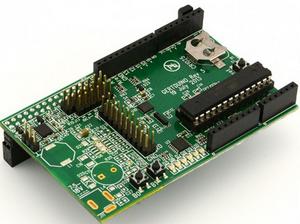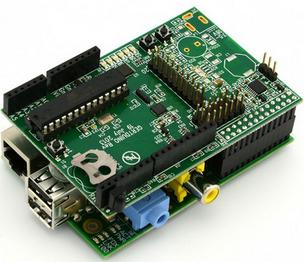
Pictured above is the new GertDuino board, developed by Gert van Loo – inventor of the popular Raspberry Pi add-on (GPIO extension) Gert Board.
The GertDuino is designed as a Raspberry Pi add-on, and gives the best of both worlds – the low power consumption and many input/output options of Arduino with the processing power and connectivity of the Raspberry Pi.
 The image above shows the GertDuino connected to the Raspberry Pi.
The image above shows the GertDuino connected to the Raspberry Pi.
The GertDuino is based around the popular Arduino Uno with a non-surface mounted ATmega328 microcontroller which can be programmed directly from the Raspberry Pi with code written and compiled on the Raspberry Pi. The GertDuino is compatible with all existing Arduino shields (Uno).
Once programmed GertDuino can be used as a standalone board or left coupled to a Raspberry Pi if the project calls for it. When connected to Raspberry Pi, it takes its 5V power supply directly from it, but as a standalone an external 5V power supply is required.
In addition to all the functionality and input/output of the Arduino Uno, a second microcontroller has been added to GertDuino (a surface mounted ATmega48) which gives an IrDA interface to the board (infrared receiver), a real time clock (with battery back up power supply – CR1025 3V button cell, not included – and high precision crystal). There is also an RS232 interface, and a couple of user push buttons and an array of six LEDs. And all this comes at a cost comparable with an original Arduino Uno board at £22.20 inc VAT available from Farnell / Element14.com.
Of most interest to us at REUK is the ability to use the GertDuino and its real time clock to wake up the Raspberry Pi only when it is needed – for example, the GertDuino could be used to monitor battery voltages or a solar water heating system, and turn on the Raspberry Pi for just a few minutes every 12 hours to process and publish the collected data. The overall power consumption of such a system would be far less than keeping the Raspberry Pi active all the time, making it much more economical to run everything from solar power. (See our article Solar Powered Raspberry Pi for details).
The user manual for GertDuino is full of information, schematics, and more on this new Raspberry Pi add-on. Click here to download and view the GertDuino User Manual (30 page PDF).